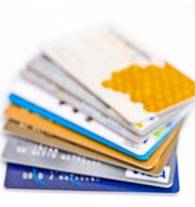When someone calls claiming to work for your credit card company, don’t even think about divulging your validation code over the phone to them because they already should have it
The callers don’t ask for your credit card number because they already have it. Credit card numbers aren’t all that difficult for a crook to get their hands on. The 3-digit validation number on the back of your card, however, is much tougher to get. Read on and learn how some identity thieves are tricking people into handing over their credit card validation numbers. Once you see how this credit card scam works, you’ll be better prepared to protect yourself from identity theft.
The scam has many variations but many work like this: You receive a phone call and the caller says, “This is (name), and I’m calling from the Security and Fraud Department at VISA (or any of the major credit card companies). My Badge number is (number). Your card has been flagged for an unusual purchase pattern, and I’m calling to verify. You can find this number on on the back of the credit card issued by your bank. Did you purchase an Anti-Telemarketing Device for $497.99 from a Marketing company based in Arizona?” When you say “No”, the caller continues with, “Then we will be issuing a credit to your account. This is a company we have been watching and the charges range from $297 to $497, just under the $500 purchase pattern that flags most cards.

Before your next statement, the credit will be sent to (gives you your address), is that correct?” You say “yes”. The caller continues – “I will be starting a Fraud investigation. If you have any questions, you should call the 1-800 number listed on the back of your card (1-800-VISA) and ask for Security. You’ll need to refer to this Control Number. The caller then gives you a 6 digit number. “Do you need me to read it again?”
How this credit card scam works
Here’s the key to the success of this scam: The caller says, “I need to verify you are in possession of your card”. He’ll ask you to “turn your card over and look for some numbers”. There are 7 numbers; the first 4 are part of your card number, the next 3 are the security numbers that verify you physically possess card. These are the numbers you sometimes use to make Internet purchases to prove you have the card. The caller will ask you to read those 3 numbers to him or her. After you give the caller the 3 numbers, he or she’ll say, “That is correct, I just needed to verify that the card has not been lost or stolen, and that you still have your card. Do you have any other questions?” After you say No, the caller thanks you and says, “Don’t hesitate to call back if you do”, and hangs up.
The call doesn’t last very long and you don’t say very much, and you’re never asked for or told you the card number that’s being verified. But after we were called on Wednesday, we called back within 20 minutes to ask a question. Are we glad we did! The REAL VISA Security Department told us it was a scam and in the last 15 minutes a new charge was made on our card. We reported this transaction as fraudulent and closed the VISA account. VISA promptly reissued us a new number.
They just want the verification number
What the scammers want is the 3 digit PIN number on the back of the card. Don’t give it to them. Instead, tell them you’ll call VISA or Master Card directly for verification of their conversation. The real VISA told us that they will never ask for anything on the card as they already know the information since they issued the card! If you give the scammers your 3 Digit PIN Number, you think you’re receiving a credit. However, by the time you get your statement you’ll see charges for purchases you didn’t make, and by then it’s almost to late and/or more difficult to actually file a fraud report.
What makes this more remarkable is that on Thursday, I got a call from a “Jason Richardson of MasterCard” with a word-for-word repeat of the VISA scam. This time I didn’t let him finish. I hung up! We filed a police report, as instructed by VISA. The police said they are taking several of these reports daily! They also urged us to tell everybody we know that this scam is happening.
Tips to help you avoid credit card fraud
- Don’t carry credit cards you don’t use and never leave them unattended in a purse, briefcase or wallet.
- Always make sure you get your credit card receipt because it just may include your credit card number. Never toss it in a public trash bin. You’ll need that receipt later anyway to tally things up when your statement arrives.
- Shred all documents that might include your credit card number before disposing of them – old slips, credit card statements, bills, anything.
- Never give your number over the phone to someone that you do not know. It’s OK if you initiate the call but if you get a call at home from anyone that you do not know by name do not give them your credit card number.
- Never respond to an e-mail asking for your number, no matter how official or legitimate it looks. These bogus e-mails are the #1 fraud right now on the Internet.
- Review your monthly statement as soon as it comes and report any problems right away. To insure your rights, follow-up by filing a written complaint form.
- Request a copy of your credit report from each of the credit reporting companies. Look them over for unauthorized credit applications.
